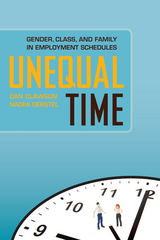2 books by Clawson, Dan

Dollars And Votes
Dan Clawson
Temple University Press, 1998
Recent scandals, including questionable fun-raising tactics by the current administration, have brought campaign finance reform into the forefront of the news and the public consciousness. Dollars and Votes goes beyond the partial, often misleading, news stories and official records to explain how our campaign system operates. The authors conducted thorough interviews with corporate "government relations" officials about what they do and why they do it. The results provide some of the most damning evidence imaginable.
What donors, especially business donors, expect for their money is "access" and access means a lot more than a chance to meet and talk. They count on secret behind-the-scenes deals, like a tax provision that applies only to a "corporation incorporated on June 13, 1917, which has its principal place of business in Bartlesville, Oklahoma." After a deal is worked out behind closed doors, one executive explains, "it doesn't much matter how people vote afterwards."
Ordinary contributions give access to Congress; megabuck "soft money" contributions ensure access to the President and top leaders. The striking truth revealed by these authors is that half the soft money comes from fewer than five hundred big donors, and that most contributions come, directly or indirectly, from business. Reform is possible, they argue, by turning away from the temptation of looking at specific scandals and developing a new system that removes the influence of big money campaign contributors.
What donors, especially business donors, expect for their money is "access" and access means a lot more than a chance to meet and talk. They count on secret behind-the-scenes deals, like a tax provision that applies only to a "corporation incorporated on June 13, 1917, which has its principal place of business in Bartlesville, Oklahoma." After a deal is worked out behind closed doors, one executive explains, "it doesn't much matter how people vote afterwards."
Ordinary contributions give access to Congress; megabuck "soft money" contributions ensure access to the President and top leaders. The striking truth revealed by these authors is that half the soft money comes from fewer than five hundred big donors, and that most contributions come, directly or indirectly, from business. Reform is possible, they argue, by turning away from the temptation of looking at specific scandals and developing a new system that removes the influence of big money campaign contributors.
[more]

Unequal Time
Gender, Class, and Family in Employment Schedules
Dan Clawson is professor of sociology at the University of Massachusetts, Amherst. Naomi Gerstel is a distinguished university professor of sociology at the University of Massachusetts, Amherst.
Russell Sage Foundation, 2014
Life is unpredictable. Control over one’s time is a crucial resource for managing that unpredictability, keeping a job, and raising a family. But the ability to control one’s time, much like one’s income, is determined to a significant degree by both gender and class. In Unequal Time, sociologists Dan Clawson and Naomi Gerstel explore the ways in which social inequalities permeate the workplace, shaping employees’ capacities to determine both their work schedules and home lives, and exacerbating differences between men and women, and the economically privileged and disadvantaged. Unequal Time investigates the interconnected schedules of four occupations in the health sector—professional-class doctors and nurses, and working-class EMTs and nursing assistants. While doctors and EMTs are predominantly men, nurses and nursing assistants are overwhelmingly women. In all four occupations, workers routinely confront schedule uncertainty, or unexpected events that interrupt, reduce, or extend work hours. Yet, Clawson and Gerstel show that members of these four occupations experience the effects of schedule uncertainty in very distinct ways, depending on both gender and class. But doctors, who are professional-class and largely male, have significant control over their schedules and tend to work long hours because they earn respect from their peers for doing so. By contrast, nursing assistants, who are primarily female and working-class, work demanding hours because they are most likely to be penalized for taking time off, no matter how valid the reasons. Unequal Time also shows that the degree of control that workers hold over their schedules can either reinforce or challenge conventional gender roles. Male doctors frequently work overtime and rely heavily on their wives and domestic workers to care for their families. Female nurses are more likely to handle the bulk of their family responsibilities, and use the control they have over their work schedules in order to dedicate more time to home life. Surprisingly, Clawson and Gerstel find that in the working class occupations, workers frequently undermine traditional gender roles, with male EMTs taking significant time from work for child care and women nursing assistants working extra hours to financially support their children and other relatives. Employers often underscore these disparities by allowing their upper-tier workers (doctors and nurses) the flexibility that enables their gender roles at home, including, for example, reshaping their workplaces in order to accommodate female nurses’ family obligations. Low-wage workers, on the other hand, are pressured to put their jobs before the unpredictable events they might face outside of work. Though we tend to consider personal and work scheduling an individual affair, Clawson and Gerstel present a provocative new case that time in the workplace also collective. A valuable resource for workers’ advocates and policymakers alike, Unequal Time exposes how social inequalities reverberate through a web of interconnected professional relationships and schedules, significantly shaping the lives of workers and their families.
[more]
READERS
Browse our collection.
PUBLISHERS
See BiblioVault's publisher services.
STUDENT SERVICES
Files for college accessibility offices.
UChicago Accessibility Resources
home | accessibility | search | about | contact us
BiblioVault ® 2001 - 2024
The University of Chicago Press









